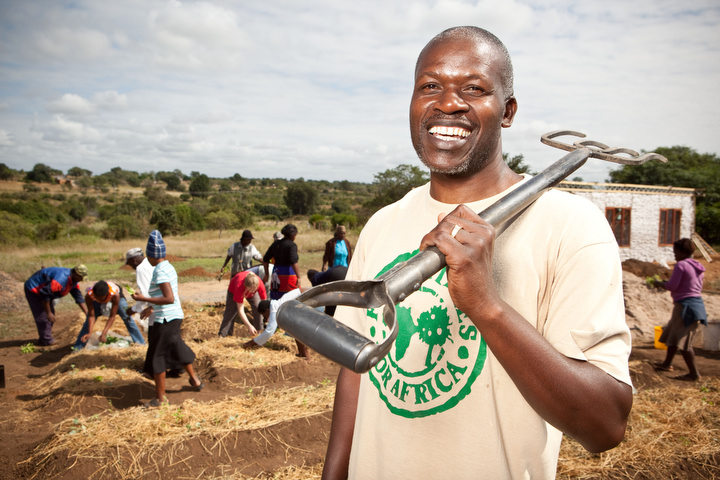Creating green jobs in South Africa and the impact of social and green grassroots entrepreneurs.
The green economy has taken hold in South Africa, and innovative products and services are being introduced by entrepreneurs even at the grassroots. But for these to grow and enhance their impact, more bridges need to be built between supporting finance, research, and skills building institutions and social and environmental enterprises. These enterprises can be instrumental in creating jobs and livelihoods while at the same time offering business solutions to environmental challenges such as climate change.
These were main messages to emerge from the SEED South Africa Symposium, held over 19 and 20 March 2014. Over 150 participants from government, private sector, media, academia, development, and civil society organisations, and including around 40 entrepreneurs, gathered at the CSIR in Pretoria to exchange experience, knowledge and perspectives that could advance the growth of socio-environmental entrepreneurship in South Africa.

credit: FEED Africa (SEED Winner 2013)
The Minister of Science and Technology, Derek Hanekom, said in his keynote speech:
South Africa is proud of its long-standing partnership with the SEED Initiative and welcomes this convening of enabling institutions and entrepreneurs to explore how we might give a significant boost to social and environmental entrepreneurship. There is no shortage of good ideas that can help South Africa along its path of green growth, from both high tech research institutions and grassroots entrepreneurs. The challenge lies in developing those into marketable and sustainable goods and services. Entrepreneurs such as the SEED Winners have a major role to play. The more supporting institutions join together and reach out to them, the greater will be these enterprises‘ social, environmental and economic impact.
The EU Ambassador to South Africa, Roeland van de Geer, said:
Green economy offers win-win opportunities to all countries, including for poverty alleviation, job creation and sustainable development. The private sector has a key role to play and the European Union is working to increase its support for green entrepreneurship both at home and in its cooperation with the third countries. Our reinforced partnership with the SEED Initiative is an important step in this direction.
The European Union and its Members States are also convinced that sustainability should underline a single set of integrated goals in the post-2015 development agenda and that private sector should be involved in the formulation of this agenda. I sincerely hope that this Symposium and SEED Initiative will come up with some concrete recommendations on innovative solutions for the promotion of green and decent jobs, which could feed into the post-2015 development agenda.
The Symposium was hosted by the SEED Initiative, in close cooperation with the Government of Flanders and the International Labour Organization (ILO), and with the sponsorship of the SEED Corporate Partner Hisense.
In opening the Symposium, the SEED Executive Director Helen Marquard said:
Social and environmental entrepreneurs working at the local level, particularly at the start-up and early phase, are true pioneers of the green economy, making it a tangible and sustainable reality. They are part of the new engine that is needed to create decent jobs, help to tackle poverty and inequality, and implement a low carbon and resource-efficient economy. Often however, they struggle to find help to develop their potential. In bringing together a wide range of institutions with hands-on entrepreneurs, the Symposium offers an important opportunity to identify in practical terms what is needed, and what is available, and how to connect the two.
Cecilia Njenga, Head of UNEP Southern Africa said:
SMMEs are critical drivers for the promotion of green jobs and the transition to a green economy. However, governments all over the world must develop instruments and mechanisms to advance social entrepreneurship as an important contribution to poverty eradication.
Discussions centred on the impact of social and environmental start-ups in creating green jobs, barriers and success factors to the growth of social and environmental entrepreneurship, and then, in a dialogue between all participants, about how government, donors and other intermediaries can support the growth of social and environmental enterprises in South Africa. The focus here was on 6 major areas: access to finance, capacity building, legal issues, market information and access, the regulatory environment, and technology and innovation.
Finance for small, micro and medium-sized enterprises, especially those operating in the social entrepreneurship space, was recognized as a major bottleneck. In looking to solutions, the Symposium provided the launchpad for a new Social Enterprise Fund, set up by the Industrial Development Corporation (IDC) with the support of the Government of Flanders which will come into effect on 1 April 2014.
The Symposium also provided participants with the opportunity to engage with the SEED Winners from South Africa: innovative start-up enterprises that offer sustainable and scalable solutions to social and environmental challenges.
A report of the meeting and the solutions identified will be available by the end of April and will be disseminated widely, including to those participating in the post-2015 development agenda.
For more information visit www.seedinit.org